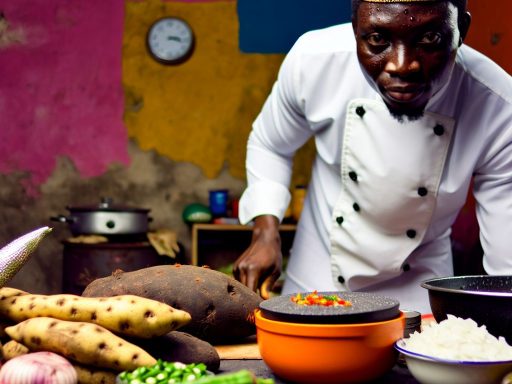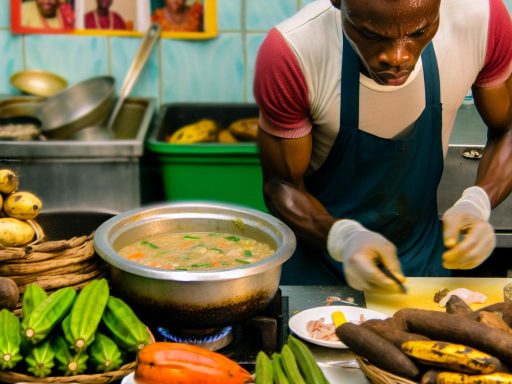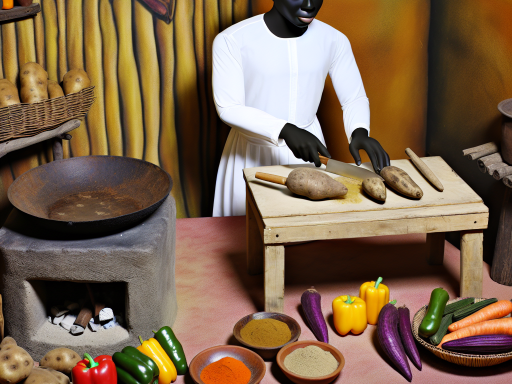Cultural Food Practices
Cultural Food Practices in Nigeria
Nigeria boasts a rich culinary heritage. Cultural food practices reflect the diversity of its people and regions.
These practices ensure the consumption of essential minerals and contribute to overall health.
Traditional Nigerian Cooking Methods
1. Boiling
Boiling is a common cooking method. It preserves nutrients in foods like yam, rice, and plantains.
Benefits:
- Retains Minerals: Boiling helps retain essential minerals in food.
- Easy to Digest: Boiled foods are easier to digest.
2. Frying
Frying adds flavor and texture to dishes. Commonly fried foods include plantains, akara, and fish.
Benefits:
- Enhances Flavor: Frying enhances the taste of food.
- Increases Calories: Provides additional energy through added fats.
3. Roasting
Roasting is popular for cooking meats and tubers. Foods like suya and roasted yam are favorites.
Benefits:
- Preserves Nutrients: Roasting retains minerals and vitamins.
- Adds Smoky Flavor: Creates a unique, smoky taste.
4. Steaming
Steaming is used for vegetables and grains. It helps preserve nutrients and enhances flavors.
Benefits:
- Preserves Nutrients: Steaming keeps minerals intact.
- Low Fat: Uses minimal fat, making it healthier.
Regional Food Practices
1. Northern Nigeria
The North is known for grains and meats. Dishes like tuwo shinkafa and kilishi are staples.
Common Foods:
- Millet and Sorghum: Rich in fiber and minerals.
- Meat Dishes: Include beef and goat, rich in protein and iron.
2. Eastern Nigeria
The East is famous for root vegetables and soups. Dishes like fufu and onugbu soup are popular.
Common Foods:
- Cassava and Yam: Provide carbohydrates and calcium.
- Vegetable Soups: Include pumpkin leaves, rich in iron and vitamins.
3. Western Nigeria
The West offers a variety of spicy foods. Jollof rice and efo riro are widely enjoyed.
Common Foods:
- Rice Dishes: Provide essential carbohydrates and minerals.
- Leafy Greens: Rich in calcium and iron, often used in soups.
4. Southern Nigeria
The South is known for seafood and tubers. Banga soup and roasted plantains are favorites.
Common Foods:
- Seafood: Rich in omega-3 fatty acids and zinc.
- Tubers: Provide essential minerals like potassium.
Celebratory Food Practices
1. Festivals
Festivals feature special foods. Jollof rice, pounded yam, and assorted meats are often served.
Examples:
- New Yam Festival: Celebrates the harvest with yam dishes.
- Eid al-Fitr: Features rice and meat dishes.
2. Weddings
Weddings showcase elaborate meals. Guests enjoy a variety of traditional dishes.
Common Dishes:
- Pepper Soup: Spicy, rich in minerals.
- Fried Rice: Colorful, nutrient-rich dish.
3. Funerals
Funerals also include traditional meals. Foods like moi moi and egusi soup are served.
Common Foods:
- Bean Cakes: Provide protein and minerals.
- Vegetable Soups: Rich in vitamins and minerals.
Importance of Cultural Food Practices
1. Nutrient Preservation
Traditional methods help preserve nutrients. This ensures that meals are both delicious and nutritious.
2. Community Bonding
Food practices strengthen community bonds. Shared meals during festivals and ceremonies enhance social connections.
3. Heritage Preservation
Cultural food practices preserve heritage. They keep traditions alive for future generations.
Conclusion
Cultural food practices in Nigeria play a vital role in maintaining health.
Traditional cooking methods and regional dishes provide essential minerals.
Celebratory foods enhance community bonds and preserve heritage.
Embrace these practices to enjoy nutritious and flavorful meals.














